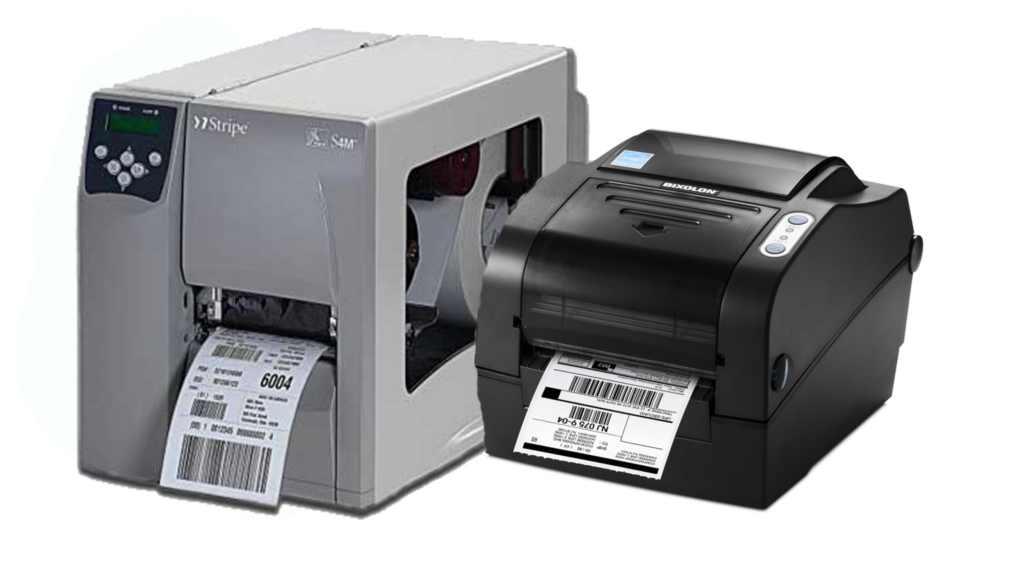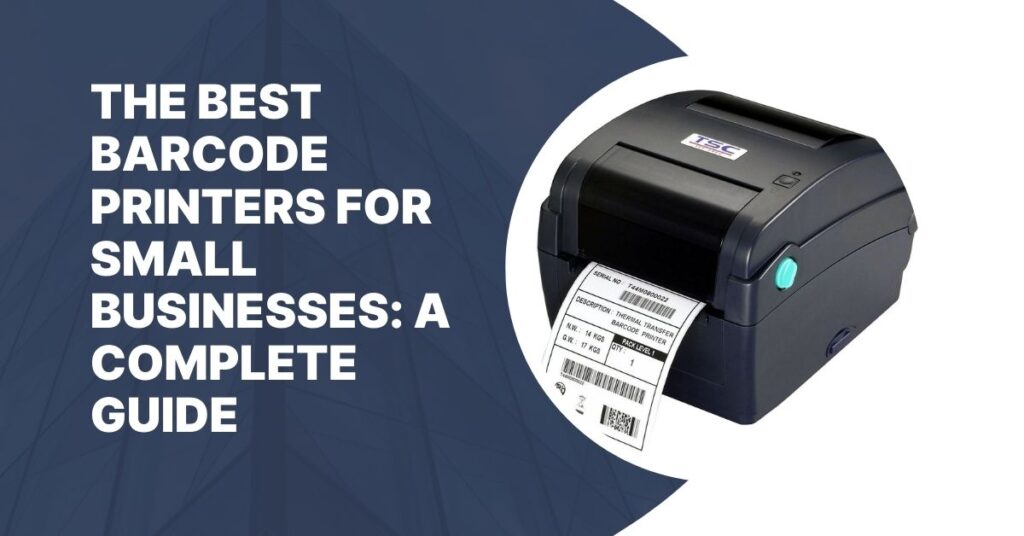For small businesses, having the right tools to keep operations running smoothly is essential. One such tool that can make a big difference is a barcode printer. Whether you’re managing inventory, processing orders, or tracking shipments, a barcode printer can save you time, reduce errors, and improve efficiency. In this guide, we will help you understand the different types of barcode printers available, why they are beneficial for small businesses, and the best options on the market today.
What is a Barcode Printer?
A barcode printer is a device used to print barcode labels. These labels are scanned to retrieve information, such as product details, inventory numbers, and customer data. Barcode printers are commonly used in retail stores, warehouses, shipping departments, and other businesses that need to track products, shipments, and inventory.
Note – Looking for the perfect barcode printer to streamline your business operations? Explore a wide range of reliable and affordable options today to enhance inventory management, improve accuracy, and save time. Find the ideal barcode printer that meets your business needs and start printing smarter!
Why Small Businesses Need Barcode Printers
For small businesses, managing inventory manually can be time-consuming and prone to human error. A barcode system automates the process, making it much easier to track and manage products. Here are a few reasons why small businesses need barcode printers:
- Improved Accuracy: Barcode systems eliminate human errors that can happen when manually entering product information. Scanning barcodes is quicker and more accurate than typing data.
- Time-Saving: Barcode printers speed up inventory management, reducing the time it takes to stock, retrieve, or track products.
- Better Inventory Control: Barcode printers make it easier to track products in real-time, helping businesses prevent stockouts and overstock situations.
- Enhanced Customer Experience: With barcodes, transactions are faster and more accurate, leading to better customer satisfaction.
- Cost Efficiency: While barcode printers require an initial investment, they can save money in the long run by reducing errors, speeding up processes, and minimizing losses.

Types of Barcode Printers
There are three main types of barcode printers: Thermal Transfer, Direct Thermal, and Inkjet. Each has its advantages and drawbacks, so it’s important to understand which one suits your needs best.
1. Thermal Transfer Printers
Thermal transfer printers are one of the most commonly used types of barcode printers. They use heat to transfer ink from a ribbon onto the label material. This results in durable, long-lasting prints that can withstand exposure to moisture, heat, and chemicals.
Advantages:
- Durable prints that last longer
- Ideal for printing high-quality barcodes
- Works well for shipping labels, product labels, and more
Disadvantages:
- Requires thermal ribbons, which can add to operational costs
- Slower printing speed compared to direct thermal printers
2. Direct Thermal Printers
Direct thermal printers don’t use ribbons. Instead, they apply heat directly to the special thermal paper, which turns black when heated. This type of printer is often used for short-term labels, such as shipping labels or receipts.
Advantages:
- No need for thermal ribbons, making it a lower-cost option
- Faster printing speed compared to thermal transfer printers
- Ideal for businesses that need labels for a short duration
Disadvantages:
- Prints tend to fade over time, especially when exposed to heat or sunlight
- Not suitable for labels that need to be durable over long periods
3. Inkjet Printers
Inkjet barcode printers use ink to print barcodes directly onto labels. These printers are typically more versatile, as they can print on various materials, including glossy, textured, and synthetic papers.
Advantages:
- High-quality prints with sharp text and barcodes
- Can print in full color, making them suitable for a range of labeling needs
- Ideal for small runs or businesses that need more variety in their labels
Disadvantages:
- Slower printing speed compared to thermal printers
- Ink can smudge or run if not properly sealed
- Higher operational costs due to ink cartridges
Key Features to Look for in a Barcode Printer
When choosing a barcode printer for your small business, several key features should be considered. These features will help you make an informed decision and choose a printer that best fits your business needs.
1. Printing Resolution
The resolution of a barcode printer refers to how detailed the prints will be. A higher resolution means that the barcodes will be sharper and more easily scannable. For most small businesses, a resolution of 203 DPI (dots per inch) is sufficient. However, if you need to print smaller barcodes or require higher precision, you may want a printer with a resolution of 300 DPI or higher.
2. Print Speed
Print speed is an important factor if you have a high-volume business where many labels need to be printed quickly. Printer speed is usually measured in inches per second (IPS). A printer with a speed of 6-8 IPS should be sufficient for most small businesses, but if you need faster results, look for printers that can print 10 IPS or more.
3. Connectivity Options
Modern barcode printers often offer a range of connectivity options to make integration with your existing systems easier. Look for printers that support USB, Ethernet, Wi-Fi, or even Bluetooth connectivity. This allows you to print labels from different devices, such as desktop computers, tablets, or mobile phones.
4. Label Size Compatibility
Make sure that the printer you choose is compatible with the size of the labels you need to print. Barcode printers typically handle standard label sizes, but if you require custom-sized labels, ensure that the printer can accommodate your specific needs.
5. Durability
If your labels need to withstand harsh environments (such as extreme temperatures, moisture, or abrasion), durability becomes a critical feature. Look for printers that are designed for industrial or high-volume use. Thermal transfer printers, for example, generally offer more durable prints compared to direct thermal printers.
6. Ease of Use
A barcode printer should be easy to set up and operate. Choose a model with user-friendly software and intuitive controls. It’s also helpful if the printer has a display screen for easy monitoring and troubleshooting.
The Best Barcode Printers for Small Businesses
Now that you know the key features to consider, let’s explore some of the best barcode printers available for small businesses.
1. Zebra GK420d Direct Thermal Printer
The Zebra GK420d is a reliable and affordable direct thermal printer that’s perfect for small businesses. It’s compact, easy to use, and supports both USB and Ethernet connectivity. With a print resolution of 203 DPI, the GK420d produces sharp barcodes and is suitable for a variety of applications, such as shipping labels, product labeling, and inventory tracking.
Why it’s great for small businesses:
- Affordable price point
- User-friendly design
- High-quality prints
2. Brother QL-1100 Direct Thermal Printer
Brother’s QL-1100 is another great option for small businesses. It supports printing large shipping labels (up to 4 inches wide) and integrates well with popular shipping software, making it ideal for e-commerce businesses. This printer uses direct thermal technology, which eliminates the need for ink or toner, making it a cost-effective choice.
Why it’s great for small businesses:
- High print speed (up to 93 labels per minute)
- Compatible with a wide range of label sizes
- Excellent for high-volume shipping and labeling
3. Rollo Label Printer (Thermal)
The Rollo Label Printer is a popular thermal printer that works well for small businesses, especially those that sell online. It prints at a high speed of 150 mm per second and can handle a variety of label sizes. It also connects seamlessly to e-commerce platforms like Shopify, Etsy, and Amazon, making it a perfect fit for online retailers.
Why it’s great for small businesses:
- High printing speed
- Works with all major shipping platforms
- Affordable with no need for ink or toner
4. Dymo LabelWriter 4XL
The Dymo LabelWriter 4XL is an excellent choice for businesses looking for a reliable and compact printer for shipping labels. It’s compatible with various shipping services and can print large-format labels up to 4 inches wide. The printer is fast, easy to set up, and requires minimal maintenance.
Why it’s great for small businesses:
- Prints large labels for shipping
- Compact and easy to store
- Great for small offices and retail stores
5. TSC TTP-245C Thermal Transfer Printer
For businesses that need a reliable thermal transfer printer, the TSC TTP-245C is a great option. It’s affordable, supports both thermal transfer and direct thermal printing, and has a resolution of 203 DPI. It’s perfect for small businesses that need to print high-quality barcodes for inventory management or product labeling.
Why it’s great for small businesses:
- Dual printing capability (thermal transfer & direct thermal)
- Affordable pricing for small businesses
- Compact and easy to use
Conclusion
Choosing the best barcode printer for your small business depends on several factors, including the volume of printing, label durability, and connectivity needs. Thermal printers are a popular choice for their reliability and cost-effectiveness, but there are many options available depending on your specific needs.
Investing in a good barcode printer will streamline your operations, reduce human error, and save time—helping your business run more efficiently. By understanding your business’s requirements and selecting the right printer, you can improve productivity, manage inventory more effectively, and enhance the overall customer experience.
For more insightful articles related to this topic, feel free to visit newsmedialive.com
